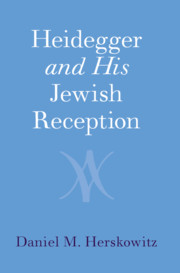Book contents
- Heidegger and His Jewish Reception
- Heidegger and His Jewish Reception
- Copyright page
- Dedication
- Contents
- Preface
- Acknowledgments
- 1 Herkunft and Zukunft: Heidegger, Christianity, and Secularization
- 2 Kant’s Legacy and New Thinking: Heidegger, Cassirer, and Rosenzweig
- 3 A Christian Anthropology? Early Jewish Readings of Sein und Zeit
- 4 Dwelling Prophetically: Martin Buber’s Response to Heidegger
- 5 The Destruktion of Jerusalem: Leo Strauss on Heidegger
- 6 God, Being, Pathos: Abraham Joshua Heschel’s Theological Rejoinder to Heidegger
- 7 Uprooting Paganism: Emmanuel Levinas Faces Heidegger
- Conclusion Which God Will Save Us? Heidegger and Judaism
- Bibliography
- Index
3 - A Christian Anthropology? Early Jewish Readings of Sein und Zeit
Published online by Cambridge University Press: 24 September 2020
- Heidegger and His Jewish Reception
- Heidegger and His Jewish Reception
- Copyright page
- Dedication
- Contents
- Preface
- Acknowledgments
- 1 Herkunft and Zukunft: Heidegger, Christianity, and Secularization
- 2 Kant’s Legacy and New Thinking: Heidegger, Cassirer, and Rosenzweig
- 3 A Christian Anthropology? Early Jewish Readings of Sein und Zeit
- 4 Dwelling Prophetically: Martin Buber’s Response to Heidegger
- 5 The Destruktion of Jerusalem: Leo Strauss on Heidegger
- 6 God, Being, Pathos: Abraham Joshua Heschel’s Theological Rejoinder to Heidegger
- 7 Uprooting Paganism: Emmanuel Levinas Faces Heidegger
- Conclusion Which God Will Save Us? Heidegger and Judaism
- Bibliography
- Index
Summary
In this chapter we will explore early Jewish interpretations of Heidegger’s philosophy that understood it as exhibiting specific Christian presuppositions regarding human existence. As we have seen in Chapter 1, the question of the significance and role of the theological undertones in Heidegger’s Dasein analytic is central to its early Christian reception. From a common Jewish standpoint, insofar as Jewish thought seeks to stay clear of Christian influences, the question of whether or not Heidegger’s thought harbors layers of Christian tradition has ramifications for the possibility of its productivity for Jewish expression. Accordingly, one way to display its inappropriateness for Jewish thought is to uncover its Christian resonances, and conversely, establishing its potential suitability for Jewish thought would require reading it as a theologically neutral portrayal of human existence. Either way, the question of secularization must be confronted: if the existential analysis of Dasein involves de-theologization and ontologization of Christian notions, is the result universally valid and neutral structures which can potentially illuminate being-Jewish? Or is something of their origin inevitably preserved, so that regardless of the absence of any explicit Christian message, Heidegger’s system is stamped by a foreign doctrine and as such at odds with Judaism?
- Type
- Chapter
- Information
- Heidegger and His Jewish Reception , pp. 91 - 127Publisher: Cambridge University PressPrint publication year: 2020

